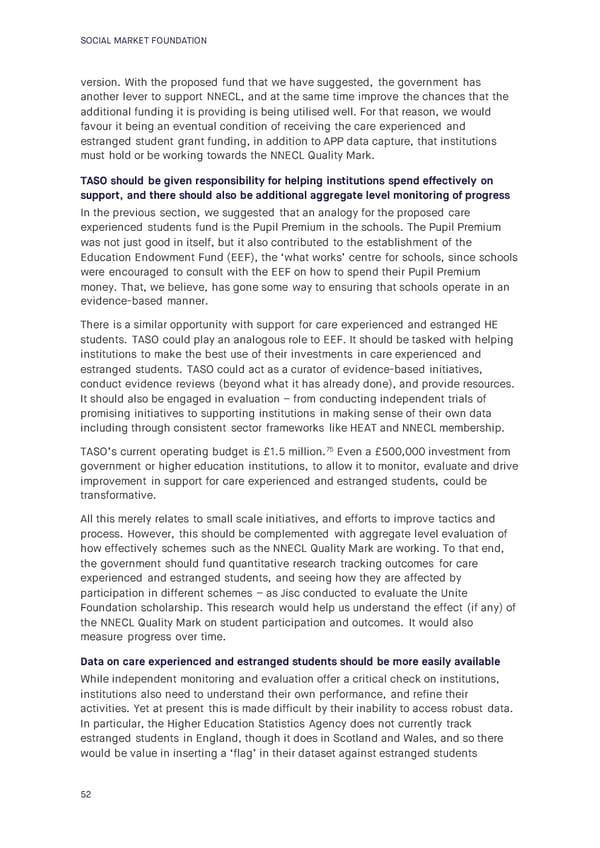SOCIAL MARKET FOUNDATION version. With the proposed fund that we have suggested, the government has another lever to support NNECL, and at the same time improve the chances that the additional funding it is providing is being utilised well. For that reason, we would favour it being an eventual condition of receiving the care experienced and estranged student grant funding, in addition to APP data capture, that institutions must hold or be working towards the NNECL Quality Mark. TASO should be given responsibility for helping institutions spend effectively on support, and there should also be additional aggregate level monitoring of progress In the previous section, we suggested that an analogy for the proposed care experienced students fund is the Pupil Premium in the schools. The Pupil Premium was not just good in itself, but it also contributed to the establishment of the Education Endowment Fund (EEF), the ‘what works’ centre for schools, since schools were encouraged to consult with the EEF on how to spend their Pupil Premium money. That, we believe, has gone some way to ensuring that schools operate in an evidence-based manner. There is a similar opportunity with support for care experienced and estranged HE students. TASO could play an analogous role to EEF. It should be tasked with helping institutions to make the best use of their investments in care experienced and estranged students. TASO could act as a curator of evidence-based initiatives, conduct evidence reviews (beyond what it has already done), and provide resources. It should also be engaged in evaluation – from conducting independent trials of promising initiatives to supporting institutions in making sense of their own data including through consistent sector frameworks like HEAT and NNECL membership. TASO’s current operating budget is £1.5 million.75 Even a £500,000 investment from government or higher education institutions, to allow it to monitor, evaluate and drive improvement in support for care experienced and estranged students, could be transformative. All this merely relates to small scale initiatives, and efforts to improve tactics and process. However, this should be complemented with aggregate level evaluation of how effectively schemes such as the NNECL Quality Mark are working. To that end, the government should fund quantitative research tracking outcomes for care experienced and estranged students, and seeing how they are affected by participation in different schemes – as Jisc conducted to evaluate the Unite Foundation scholarship. This research would help us understand the effect (if any) of the NNECL Quality Mark on student participation and outcomes. It would also measure progress over time. Data on care experienced and estranged students should be more easily available While independent monitoring and evaluation offer a critical check on institutions, institutions also need to understand their own performance, and refine their activities. Yet at present this is made difficult by their inability to access robust data. In particular, the Higher Education Statistics Agency does not currently track estranged students in England, though it does in Scotland and Wales, and so there would be value in inserting a ‘flag’ in their dataset against estranged students 52
 Care and Learning in Higher Education Page 52 Page 54
Care and Learning in Higher Education Page 52 Page 54